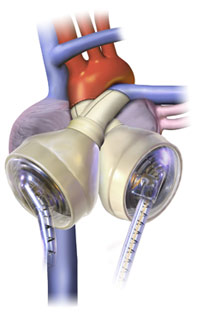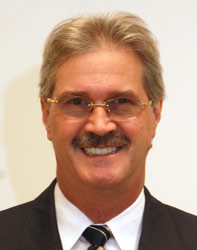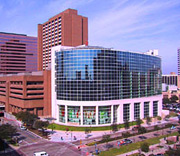Four Total Artificial Hearts Implanted in 12 Days
Artificial Heart Pioneer, Dr. Denton A. Cooley, Observes
Houston, Texas (August 8, 2011) – Doctors at the Texas Heart Institute (THI) at St. Luke's Episcopal Hospital (SLEH) have announced that they implanted the SynCardia temporary Total Artificial Heart in 4 patients with biventricular end-stage heart failure during a 12-day period beginning July 21, bringing the total number of the devices implanted worldwide to over 950.
| VIDEO: Artificial hearts giving hope, saving lives. ABC13's Christi Myers reports. |
 |
| Illustration of the SynCardia temporary Total Artificial Heart, a bridge to transplant. |
"We've come a long way since that first implant, and I am proud that THI continues to lead the way in such technology to help patients," said THI's founder Dr. Denton A. Cooley, who performed the world's first artificial heart implant in 1969. The device implanted during that historic operation was a predecessor of the SynCardia heart.
"In the use and development of this and other life-changing devices, we want to remain a leader," added THI President and Medical Director James T. Willerson, MD. "Today we have four new reasons, our patients, why that is important."
The SynCardia temporary Total Artificial Heart was approved in 2004 by the FDA, following a 10-year clinical study, as a "bridge to transplant" for patients with both sides of their heart failing (biventricular failure). In many cases, patients have only two options, an immediate transplant or the SynCardia device until a donor heart can be found.
The "bridge to transplant" option is critical since, despite growing demand, only about 2,200 donor hearts become available each year in the U.S. Wait times for a donor heart can exceed a year or more.
Similar to a heart transplant, SynCardia's Total Artificial Heart replaces both failing heart ventricles and the four heart valves. In most cases, SynCardia's heart restores blood flow, pumping up to 9.5 liters per minute, and eliminates complications associated with the patient's failing heart. This helps vital organs to recover faster and allows patients to be better transplant candidates when a donor heart does become available.
 |
|
Dr. Igor Gregoric |
The implants were performed at SLEH by
Dr. Igor Gregoric, director of THI's Center for Cardiac Support and associate director of Cardiovascular Surgery and Transplant Research. As part of the transplant team, cardiologists Dr. Pranav Loyalka and Dr. Biswajit Kar also played key roles in bringing the device to THI at SLEH..
"For patients who are out of options, these devices are absolutely critical. And in most cases, the patients see marked improvement in their quality of life and how well they feel," said Dr. Gregoric. "It is an extremely valuable device."
Among the four recently implanted patients is a 22-year-old man who had previously received a heart transplant at the age of 2 at THI.
Dr. O.H. "Bud" Frazier, who performed that transplant and also worked on research for the first pump used in the very first artificial heart implant, is chief of THI's Center for Cardiac Support and has helped in the development of SynCardia's heart and other such devices.
"Sometimes, these patients need our intervention immediately. They don't have the luxury of waiting. The decades we've spent working on this are now buying people that precious time they need," said Dr. Frazier.
THI at SLEH is the 20th SynCardia Certified Center in the U.S. The device is made by SynCardia Systems, Inc. in Tucson, Ariz. More information is available at www.syncardia.com.
For media inquiries please contact:
Director of Public Affairs
Texas Heart Institute at St. Luke's Episcopal Hospital
Frank Michel ♦ 832-355-9510 ♦ fmichel@heart.thi.tmc.edu
For THI and St. Luke's media profiles, see Public Affairs.



